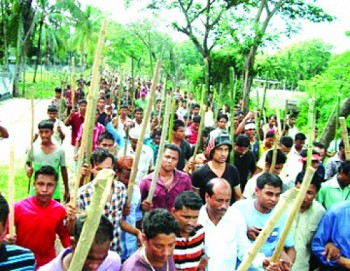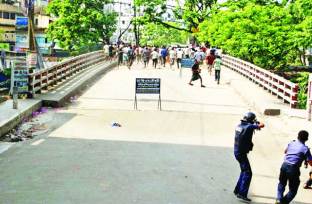Mull over this: if a temple is ransacked in the forest, but no one is around to hear it, does it make a sound?
As per bdnews, several temples and shops were burned. This ransacking went on for two days. Bdnews says:
The leaders of the Hindu minority there blamed the ‘indifference’ of the administration for the situation.
The problem is, the facts suggest otherwise. The local level administration tried to hold some meetings and head off any trouble before things got out of hand. Then Anisul Islam Mahmud, the local MP stepped in. Now, he isn’t just your typical Jatiyo Party MP who has trouble even doing something innocuous as taking over a local hospital. Mahmud, along with Ziauddin Bablu, is Sheikh Hasina’s enforcer in Jatiyo Party, and is tasked with making sure that JP Chief H. M. Ershad stays in line. As such, Mahmud has, at all times, the ear of the Prime Minister. When he was not successful (by some accounts, he was chased by local people and had to be rescued by police), Afsarul Amin showed up. Afsarul Amin is the senior representative from Chittagong in this current cabinet, and was probably the best person for the job since former mayor Mohiuddin Chowdhury refused to get involved in this matter. Amin, too, failed to get things under control. It took the deployment of a heavy contingent of police and RAB to finally bring the situation under control.
And then, poof. The matter disappeared from our media. No follow-up reports to investigative articles. No allocation of the blame.
Or rather, some allocation of the blame. Four days after the incident, Nurul Islam, another MP from Chittagong and the leader of one of the three factions currently active in Chittagong AL, said this:
চট্টগ্রামে হিজবুত তাহরির, জেএমবি নিয়ে আমি দীর্ঘদিন চিৎকার করছি। শেষ পর্যন্ত তারা হাটহাজারীতে ঘটনা ঘটিয়েই ফেলল। ঘটনার বর্ণনা আমি দিতে চাই না। তবে চট্টগ্রাম-৮ আসনে সন্ধ্যা ৬টা থেকে রাত ১টা পর্যন্ত মন্দিরে মন্দিরে ঘুরে ঘুরে আমি পাহারা দিয়েছি।
I have been complaining for a long time about Hijbut Tahrir and the JMB. At last, they succeeded in causing the incident at Hathazari. I don’t want to go into the details of the incident, but I personally went from temple to temple between 6 pm and 1 am to guard everyone
The column was, ironically, titled “যার কাজ তাকেই করতে হবে”. Islam is silent on whether he thinks it is now his job to patrol the city at night to ensure law and order. Islam’s allegation that HiT and JMB are behind the attacks are also problematic. Both groups are banned in Bangladesh; people routinely get arrested for just owning literature that espouses their cause. That they would go on a violent rampage for two days, and be met with negotiation and discussion from the highest levels of the government, is fantasy, pure and simple.
Then day after, Abdul Mannan, the former Vice Chancellor of Chittagong University, who is now the designated pro-AL voice in Prothom Alo, wrote this:
একবাক্যে সবাই স্বীকার করেছে যারা এই দুদিন এমন একটি শান্তিপূর্ণ এলাকায় ধর্মীয় অনুভূতিকে উসকানি দিয়ে পরিস্থিতি ঘোলাটে করতে চেয়েছিল তাদের উদ্দেশ্য কী ছিল? ইসলামী ছাত্রশিবির চট্টগ্রাম বিশ্ববিদ্যালয়ের ঘটনাকে কেন্দ্র করে নন্দীরহাটের ঘটনার সূত্রপাতের দিন চট্টগ্রাম শহরে আধবেলা হরতালের নামে বেশ অনেকগুলো গাড়ি ভাঙচুর করেছে। তারা কোনো কোনো এলাকায় যুদ্ধাপরাধীদের দায়ে তাদের অভিযুক্ত নেতাদের মুক্তি দাবি করেছে। সবকিছু একসঙ্গে করলে সহজে এই উপসংহারে আসা যাবে যে এসব কোনো অপকর্মই হঠাৎ ঘটে যাওয়া কোনো বিষয় ছিল না। সবকিছুর পেছনে সুপরিকল্পিত প্রস্তুতি ছিল এবং উদ্দেশ্য একটাই, যুদ্ধাপরাধীদের বিচার বানচাল করা।
Everyone fully admits to being curious about the motive of those who instigated this incident in a previously peaceful area. Islami Chatra Shibir destroyed several vehicles on the day this incident started, which coincided with a hartal they had called. In some areas, they have demanded the release of their leaders who are now standing trial for war crimes. If all the dots are connected, we can easily come to the conclusion that this was not a solitary incident. There was a singular and well-planned motive, and that was to foil the trial of the war criminals
ICS, Jamaat’s student body, is currently under a state of siege, much like its parent organization. Awami League has consistently chosen to use overwhelming force anytime Jamaat or Shibir was bringing out even peaceful protests. Again, to suggest that the government would passively stand by and allow Shibir to take control of a key Chittagong suburb for two days and stand by passively is to show a reckless disregard to the ground reality of Bangladesh.
To sum up, we have what is, by all accounts, a communal riot, that the government did its best to nip in the bud. Its conduct afterwards, however, seems to have been less than honorable. That our media has gone completely silent on this story, while printing the self-serving allegations of Awami League politicians and intellectuals, is a stain on the entire industry. That the said politicians and intellectuals pin the blame on different groups only makes this matter more ridiculous. And as for the Awami League government, it would do well to remember one of the eternal truths of politics: it’s always the cover-up, not the crime itself, that gets you.









